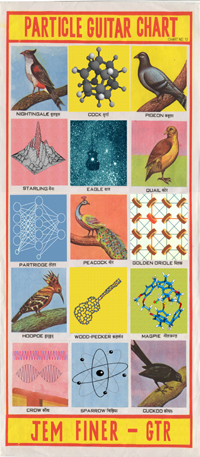 |
dimestore acoustic meets the supercomputer
Reviewed : at the milkfactory . . . and here
|
gtr
Having
spent 15 years playing banjo and assorted other instruments I started
to use the computer more and more to make music. Starting work on the
composition of Longplayer
in the mid 1990's (a 1000 year long piece of music ) meant abandoning
even the input of data with keyboard as I was working more and more
and more with emergent systems.
By the time Longplayer started I was having a problem finishing anything.
The nature of working with Longplayer was so much based in long durational
processes that my whole approach to "composing" had changed
beyond all recognition.
I wanted to find some way of using these new strategies to actually
perform music live - something I'd started to miss.
I spent a bit of time working out a framework in SuperCollider
(real time audio programming language) so that I could have to hand
a library of "instruments" which I could call up and run in
parallel, with control over both their parameters (via individual edit
windows) and their relative volumes (via a global mixer). This worked
in a modular manner so that as I wrote new "instruments" I
could simply add them into the library. Their functions ranged from
simple effects - delays, filters etc - to various emergent systems.
For example there's an instrument that’s based directly on Longplayer
- except it takes only between 10 and 60 minutes to play itself out.
I played a bit using this system with samples and then mixing this approach
with sampling other people and using that input as material. I felt
though that something was missing . . .
I realised that somewhere along the line I'd managed to reduce my physical
participation in making music to one hand on a mouse - or a finger on
a track pad - and my brain, eyeball and ears. I may has well have been
some sci fi freak with a robo arm wired to a pulsating brain floating
in solution.
I decided to go along to open rehearsals for L.E.G.O. (London Electric
Guitar Orchestra) that were advertised in an London Musicians Collective
mail-out and started playing guitar again.
In July 2001 I was invited to take part in a SuperCollider event at
Public Life in Spitalfields. This was to involve talking a bit about
ones approach to using SC and then playing for a while. I decided to
talk about my frustrations with the loss of my body . . and try and
re involve it.
I called it "ooops, where's my body gone ? . . . . one finger music
and the terror of infinity". The terror of infinity bit referred
to trying to find ways to come to terms with the exponentially expanding
number of possibilities and outcomes of working with computers and obliquely
to Longplayer. One of the instruments I was working on was based on
the idea of genetic algorithms. A way to breed music from the overwhelming
mess of permutations of certain processes. I digress, that never really
got anywhere.
I figured that one thing to do was to start using an instrument again
and find a way to interface it with my SuperCollider system.
I'd never been that happy playing keyboards so I decided to use the
guitar. I started to wonder if I could find a way of avoiding midi and
started to experiment with a system using pitch recognition. I wrote
a simple instrument which read the pitch of the guitar and used that
to set playback rate of a sample - which could be that very note that
was being recognised. This could get messy but gave rise to a simple
and exciting feedback loop between what I played and what the computer
did in response . . . and back to me and the guitar again.
The guitar became a form of controller and sound source. All the raw
material for SuperCollider came from the guitar. The experience of playing
with L.E.G.O. had led me to treat the instrument in much more varied
way . . . so I wouldn't just strum away, I'd use different preparations
and quirks.
This was the basis then of a new approach. My buggy programming added
to the unpredictability of the computers response. A lot of the instruments
I wrote didn't work exactly as planned. Things would start to happen
which I had no idea where they came from. Another bonus was that by
getting away from midi control I escaped the quantisation that comes
with it.
So I got (some of) my body back and the found a way to perform music
based on emergent processes. The outstanding problem of computer crashes
found a resolution in accepting that these were decisions of the computer,
my collaborator, to call a halt. So a crash meant that that was the
end of the piece. Otherwise it was up to me to guide the improvisation
between us to a conclusion. "gtr" is a collection of edited
improvisations that grew out of the above, guitars played live with
various preparations and processed live by my SuperCollider "Particle
Guitar" system.
Listen :
dimestore acoustic meets the supercomputer
These tracks should stream through your default mp3 player.
Look :
offworld movie 13 MB
Buy now directly using PayPal
or from our reseller, Kagi.
To use PayPal you need to be, or become, a member.
Kagi
accepts all major credit cards
Kagi
To order from Kagi click here
Pay Pal
£11.50 inc p & p
(UK)
£12.50 inc p & p
(rest of the world)
For payment via cheque or cash please email :